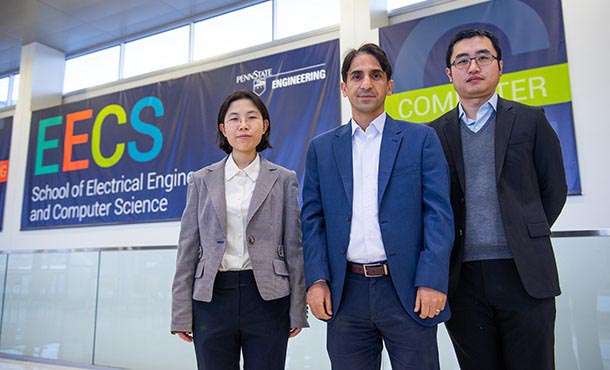
From left to right: Shengxi Huang, assistant professor of electrical engineering and biomedical engineering, Mehdi Kiani, the Dorothy Quiggle Career Development Assistant Professor of Electrical Engineering, and Danfeng Zhang, assistant professor of computer science and engineering, pose together for a photo taken in January. IMAGE: PENN STATE COLLEGE OF ENGINEERING
Three electrical engineering and computer science faculty earn NSF CAREER Awards
4/14/2020
By Sarah Small
UNIVERSITY PARK, Pa. — Three faculty members from the School of Electrical Engineering and Computer Science (EECS) in the Penn State College of Engineering have been awarded Faculty Early Career Development Program (CAREER) Awards from the National Science Foundation (NSF).
The 2020 recipients from the School of EECS are Shengxi Huang, assistant professor of electrical engineering and biomedical engineering; Mehdi Kiani, the Dorothy Quiggle Career Development Assistant Professor of Electrical Engineering; and Danfeng Zhang, assistant professor of computer science and engineering.
This award is given “in support of early-career faculty who have the potential to serve as academic role models in research and education and to lead advances in the mission of their department or organization,” according to the NSF’s website.
“The fact that three of our faculty received CAREER Awards demonstrates the high quality of the new faculty that we have hired,” said Tom La Porta, director of the School of EECS, Evan Pugh Professor and William E. Leonhard Endowed Chair. “This award, and their high levels of success so far, will allow the school to keep excelling in world class research and continue to grow our research efforts.”
Building on her previous research, Huang will use her NSF CAREER Award to develop a highly sensitive, tunable sensor that will have a strong and highly reproducible signal and be able to detect multiple molecules or components simultaneously. Existing methods for detecting molecules tend to have trade-offs in desirable qualities. For example, a sensor may be able to detect multiple molecules at once in a minimally invasive way, but it will have a weak signal, or it will have a stronger signal but not be highly reproducible. Huang aims to identify the vibrational modes of molecules and combine that information with 2D materials in order to overcome some of the method’s weaknesses to create better sensors.
“This research could provide a brand-new sensing mechanism that will guide the design of new sensing devices,” Huang said. “These new sensing platforms can be used for different applications ranging from agriculture monitoring to security to medical diagnostics.”
With his NSF CAREER Award, Kiani will work to develop an improved, minimally invasive method for recording and modulating neurons in the brain. Currently, the methods that can provide high-spatial resolution in measuring and controlling neuron activity in the brain are invasive and are limited to a small section of the brain instead of the entire brain. The minimally invasive methods for neuromodulation tend to have low-spatial resolution. Kiani is using ultrasound to develop a minimally invasive, high-spatial resolution neural interface on a large scale, over the entire brain. If successful, according to Kiani, this method has the potential to map brain functions, restore lost sensory and motor functions and enhance perceptual, motor and cognitive capabilities.
“The most exciting aspect of this research to me is its multidisciplinary nature,” Kiani said. “It requires research and development in several fascinating areas including integrated circuits, ultrasound and neuroscience.”
Zhang’s research will focus on improving software security with dynamic security policies. Many virtual and digital security policies change at different points in time, making them dynamic in nature. For example, a payment system is allowed to use credit card details during a transaction, but it should not retain any record of credit card details after the transaction is complete. The dynamic needs of such systems make building, verifying and debugging software more difficult.
“Vulnerability analysis and program verification are not new,” Zhang said. “But most existing techniques assume a static security policy, where data confidentiality remains the same throughout the lifetime of the software. However, this is rarely the case in reality.”
Zhang will use this award to explore novel techniques for finding vulnerabilities in existing software, as well as for building, debugging and verifying that software satisfies the intended dynamic security policies.



